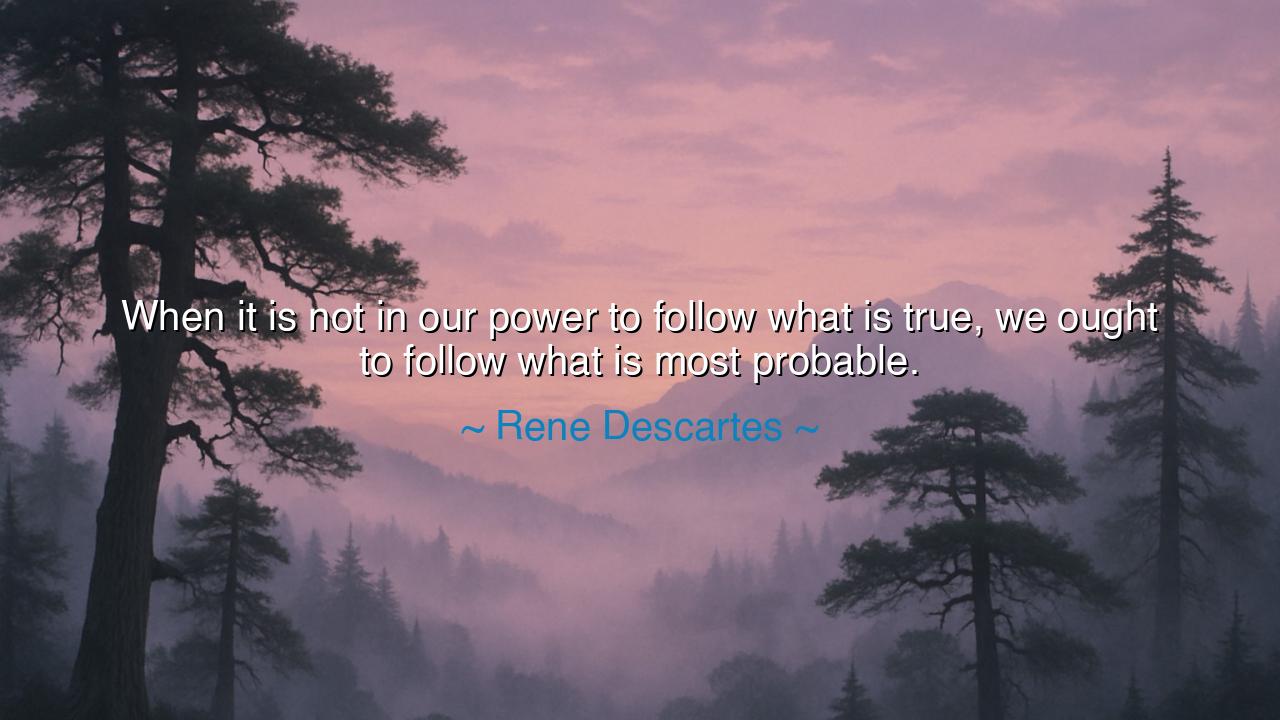
When it is not in our power to follow what is true, we ought to
When it is not in our power to follow what is true, we ought to follow what is most probable.






The words of René Descartes—“When it is not in our power to follow what is true, we ought to follow what is most probable.”—speak to the humility of the human mind in the face of mystery. For truth, in its purity, is often veiled; the world is vast, and the knowledge of mortals is small. Yet Descartes, the seeker of certainty, reminds us that when truth cannot be grasped, we must not fall into paralysis, but act in accord with probability—the path most guided by reason, evidence, and wisdom.
This utterance is born from Descartes’ struggle with doubt. In his meditations, he sought an unshakable foundation for knowledge, questioning everything, even the existence of the world itself. Yet he knew that life cannot be lived in endless hesitation. When the clear light of certainty fails, one must walk by the lantern of probability. Better to move forward guided by what is most likely than to stand frozen in darkness.
History reflects this wisdom in the voyages of Christopher Columbus. He did not know with certainty what lay across the ocean; indeed, much of what he believed was mistaken. Yet he sailed on probability—the accumulated whispers of maps, stories, and reasonings that suggested land lay to the west. Though his vision was flawed, his willingness to follow what seemed most probable changed the course of history. Thus, Descartes’ counsel finds echo: truth may be hidden, but probability can still guide destiny.
The quote also speaks to the balance of courage and caution. To demand perfect knowledge before acting is to accomplish nothing, for certainty is rare in the affairs of men. To act blindly without reason is folly. But to walk with probability is to tread the middle path, where wisdom tempers courage, and reason steers ambition. In this balance lies the strength of great leaders, inventors, and seekers of knowledge.
Let this wisdom endure: when the flame of truth is obscured, seek the glow of what is most probable, and let it guide your steps. Do not be deceived into thinking that uncertainty is weakness; it is the natural state of mortals. The wise are those who act even in imperfection, guided not by reckless chance but by thoughtful discernment. As Descartes teaches, though truth is the crown, probability is the staff that sustains us on the journey.






TAha tram anh
There’s something deeply practical in this view — it’s almost like Descartes is telling us to make the best decision possible with what we know. Still, it raises questions about how far we can go on probabilities before our reasoning becomes speculative. For instance, in ethics or politics, following what’s probable can easily justify questionable choices. I wonder: does Descartes imply a hierarchy of probability — that some likelihoods are more ‘truth-worthy’ than others?
TTCao Thang THCS
I appreciate the humility in this idea — it admits that truth is not always accessible. Yet, I feel uneasy about relying on what’s merely probable. What if what’s ‘most probable’ turns out to be shaped by bias or incomplete information? In today’s world of AI and data-driven conclusions, this thought feels especially relevant. Should probability replace certainty as our moral or intellectual compass when truth is elusive, or should we always keep skepticism alive?
Tthien
This quote really makes me question the relationship between truth and belief. If we can’t reach absolute truth, are we settling for probability as a kind of intellectual compromise? It sounds reasonable, but isn’t that also how misinformation gains traction — by appearing probable? I’m curious how this fits into Descartes’ broader philosophy of doubt. Would he say following probability is still a form of rational inquiry, or a concession to human weakness?
KTdo kim tuan
I find this statement intriguing because it acknowledges human limitation while still emphasizing rational action. But it makes me wonder — how do we truly distinguish between what’s probable and what’s simply convenient? In times of uncertainty, people often confuse plausibility with comfort. I’d love to hear how Descartes would apply this idea to modern scientific reasoning or decision-making under ambiguity. Does probability, in this sense, justify belief, or merely guide behavior until truth is known?